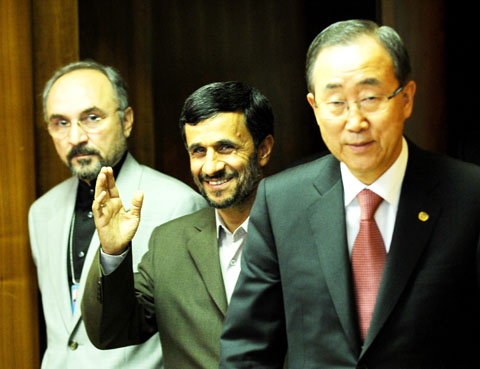World leaders opened their annual UN debate yesterday, with top geopolitical issues like the crisis in Georgia, Iran’s nuclear ambitions and rights abuses in Darfur overshadowed by the global financial crisis.
More than 120 heads of state or government are attending the weeklong General Assembly’s general debate in New York, which UN Secretary-General Ban Ki-moon was to open at 9am.
Britain’s UN Ambassador John Sawers told reporters on Monday that the financial crisis would be “uppermost on the minds” of world leaders who “will want to address that issue as well as issues on the UN agenda.”

PHOTO: AFP
Indeed US President George W. Bush, who will address the assembly for the last time before he leaves office, was expected to “talk some about the recent action he took to help stabilize our markets and the global impact of that,” his spokesman Gordon Johndroe said on Monday.
Bush has been pushing the US Congress to approve his proposed US$700 billion bailout, but his Democratic critics and even some fellow Republicans have criticized the plan.
Bush is also expected to urge Russia to honor its commitment to fully withdraw its troops from Georgia and, according to Johndroe, “will talk about the role of multilateral institutions, the need for them to be effective in combating terrorism, but also help spread freedom.”
Another keynote speaker scheduled yesterday was French President Nicolas Sarkozy, whose country holds the rotating EU presidency and who brokered the truce deal which ended the five-day war in August between Russia and Georgia for control of the breakaway enclaves of South Ossetia and Abkhazia.
In the afternoon, it was to be Iranian President Mahmoud Ahmadinejad’s turn to take the floor.
It would be Ahmadinejad’s fourth visit to the US for the UN General Assembly since his election in 2005. He is also due to meet students, religious leaders and foreign politicians.
The firebrand Iranian leader has used previous UN visits to attack Iran’s arch-foes, the US and Israel, and to defend Tehran’s nuclear program which the West fears could be used for weapons development.
Foreign ministers of Britain, China, France, Germany, Russia and the United States are to meet tomorrow on the sidelines of the assembly debate to weigh prospects for a fourth round of UN sanctions against Iran for its nuclear defiance.
Georgian President Mikheil Saakashvili was also scheduled to address the assembly yesterday and was expected to appeal for world support in his country’s conflict with Russia.
One major theme for this year’s debate will be the flagging battle to achieve the poverty reduction Millennium Development Goals by a 2015 deadline against a backdrop of soaring food and energy prices.
A summit meeting on implementing the goals is scheduled for tomorrow on the margins of General Assembly. Various world leaders and top officials from the private sector, foundations and civil society are expected to attend.

Kehinde Sanni spends his days smoothing out dents and repainting scratched bumpers in a modest autobody shop in Lagos. He has never left Nigeria, yet he speaks glowingly of Burkina Faso military leader Ibrahim Traore. “Nigeria needs someone like Ibrahim Traore of Burkina Faso. He is doing well for his country,” Sanni said. His admiration is shaped by a steady stream of viral videos, memes and social media posts — many misleading or outright false — portraying Traore as a fearless reformer who defied Western powers and reclaimed his country’s dignity. The Burkinabe strongman swept into power following a coup in September 2022

‘FRAGMENTING’: British politics have for a long time been dominated by the Labor Party and the Tories, but polls suggest that Reform now poses a significant challenge Hard-right upstarts Reform UK snatched a parliamentary seat from British Prime Minister Keir Starmer’s Labor Party yesterday in local elections that dealt a blow to the UK’s two establishment parties. Reform, led by anti-immigrant firebrand Nigel Farage, won the by-election in Runcorn and Helsby in northwest England by just six votes, as it picked up gains in other localities, including one mayoralty. The group’s strong showing continues momentum it built up at last year’s general election and appears to confirm a trend that the UK is entering an era of multi-party politics. “For the movement, for the party it’s a very, very big

ENTERTAINMENT: Rio officials have a history of organizing massive concerts on Copacabana Beach, with Madonna’s show drawing about 1.6 million fans last year Lady Gaga on Saturday night gave a free concert in front of 2 million fans who poured onto Copacabana Beach in Rio de Janeiro for the biggest show of her career. “Tonight, we’re making history... Thank you for making history with me,” Lady Gaga told a screaming crowd. The Mother Monster, as she is known, started the show at about 10:10pm local time with her 2011 song Bloody Mary. Cries of joy rose from the tightly packed fans who sang and danced shoulder-to-shoulder on the vast stretch of sand. Concert organizers said 2.1 million people attended the show. Lady Gaga

SUPPORT: The Australian prime minister promised to back Kyiv against Russia’s invasion, saying: ‘That’s my government’s position. It was yesterday. It still is’ Left-leaning Australian Prime Minister Anthony Albanese yesterday basked in his landslide election win, promising a “disciplined, orderly” government to confront cost-of-living pain and tariff turmoil. People clapped as the 62-year-old and his fiancee, Jodie Haydon, who visited his old inner Sydney haunt, Cafe Italia, surrounded by a crowd of jostling photographers and journalists. Albanese’s Labor Party is on course to win at least 83 seats in the 150-member parliament, partial results showed. Opposition leader Peter Dutton’s conservative Liberal-National coalition had just 38 seats, and other parties 12. Another 17 seats were still in doubt. “We will be a disciplined, orderly